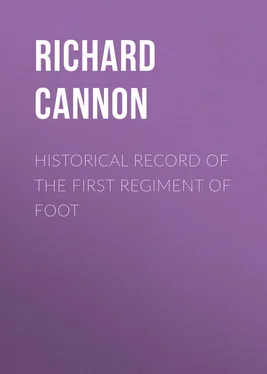Richard Cannon - Historical Record of the First Regiment of Foot
Здесь есть возможность читать онлайн «Richard Cannon - Historical Record of the First Regiment of Foot» — ознакомительный отрывок электронной книги совершенно бесплатно, а после прочтения отрывка купить полную версию. В некоторых случаях можно слушать аудио, скачать через торрент в формате fb2 и присутствует краткое содержание. Жанр: foreign_antique, foreign_prose, на английском языке. Описание произведения, (предисловие) а так же отзывы посетителей доступны на портале библиотеки ЛибКат.
- Название:Historical Record of the First Regiment of Foot
- Автор:
- Жанр:
- Год:неизвестен
- ISBN:нет данных
- Рейтинг книги:4 / 5. Голосов: 1
-
Избранное:Добавить в избранное
- Отзывы:
-
Ваша оценка:
- 80
- 1
- 2
- 3
- 4
- 5
Historical Record of the First Regiment of Foot: краткое содержание, описание и аннотация
Предлагаем к чтению аннотацию, описание, краткое содержание или предисловие (зависит от того, что написал сам автор книги «Historical Record of the First Regiment of Foot»). Если вы не нашли необходимую информацию о книге — напишите в комментариях, мы постараемся отыскать её.
Historical Record of the First Regiment of Foot — читать онлайн ознакомительный отрывок
Ниже представлен текст книги, разбитый по страницам. Система сохранения места последней прочитанной страницы, позволяет с удобством читать онлайн бесплатно книгу «Historical Record of the First Regiment of Foot», без необходимости каждый раз заново искать на чём Вы остановились. Поставьте закладку, и сможете в любой момент перейти на страницу, на которой закончили чтение.
Интервал:
Закладка:
After placing a garrison in Landsberg, the detachment commenced its march on the 18th of April, back to Frankfort; and Hepburn's Regiment proceeded soon afterwards to the vicinity of Berlin. Attempts were made to induce the Duke of Brandenburg to join with the Swedes, and when persuasion proved unavailing, the city of Berlin was invested. The Duke, alarmed at this hostile proceeding, sent his Duchess and the ladies of the court to entreat Gustavus to forbear; but the Swedish monarch proved inexorable, and the Duke of Brandenburg was forced to comply.
In July the regiment proceeded to Old Brandenburg, and on its arrival, a pestilential disease raging in the city, the regiment was ordered to encamp in the fields. During the same month the Marquis of Hamilton arrived in Germany with six thousand British troops, which had been raised for the service of the King of Sweden.
The regiment was subsequently engaged in several operations. It encamped a short time near the banks of the Elbe, in the vicinity of Werben , where an entrenched camp was formed, which was attacked several times by the Imperialists without success.
The Saxons at length united their force with the Swedes; at the same time the Imperialists, under the Count de Tilly, invaded Saxony, and captured several towns, including Leipsic . The Swedish and Saxon armies advanced against the invaders, and this movement was followed by the decisive battle of Leipsic , in which Colonel Hepburn's Regiment took an important part. 21 21 In a list of Gustavus's army published at the time, in the Mercure François , the regiment is stated to have displayed four colours at the battle of Leipsic.
Having passed the night in order of battle, at day-break, on the morning of the memorable 7th of September, 1631, divine service was performed in the Swedish army, and the troops afterwards advanced against the enemy. The Swedes took the right, and the Saxons the left. The advance guard was composed of three regiments, two Scots and one Dutch, led by three Scots colonels; and Hepburn's Scots Brigade formed part of the reserve, which was commanded by Colonel Hepburn. The engagement commenced about mid-day; and after a tremendous cannonade, the cavalry of both armies advanced and engaged in a series of charges, in which the Swedish and Finland horse had the advantage; and the King was enabled to change his position so as to avoid the evil effects of a high wind and clouds of dust which nearly blinded his soldiers. At length the enemy attacked the Saxons on the left with great fury, and drove them out of the field. The Imperialists then directed their main force against the Swedes, and a detachment from the Scots regiments highly distinguished itself in a conflict with the enemy's cavalry. 22 22 "The King having noticed that the Duke of Saxony was leaving the field, and that Count Tilly was ready to charge his main body, selected 2,000 musketeers of the brave Scots nation, and placed 2,000 horse on their flanks. The Scots formed themselves in several bodies of six or seven hundred each, with their ranks three deep (the King of Sweden's discipline being never to march above six deep;) the foremost rank falling on their knees, the second stooping forward, and the third standing upright, and all giving fire together, they poured, at one instant, so much lead amongst the enemy's horse, that their ranks were broken, and the Swedish horse charging, the enemy were routed." — Account of the battle of Leipsic published at the time.
During the heat of the conflict Hepburn's Scots Brigade was moved from the rear of the centre to the left flank, which had become exposed by the flight of the Saxons. Immediately afterwards two columns of the enemy were seen coming down upon the left of the Swedish army, and the King ordered Hepburn's Scots Brigade to wheel to the left and confront the enemy. Before this movement was executed, the Imperialists were within musket shot; in a moment the artillery on both sides opened a tremendous cannonade; this was followed by two volleys from the musketeers, and the next moment Hepburn's pikemen went cheering to the charge with distinguished bravery, and, breaking in upon the front of the first column, drove it back with terrible confusion and slaughter. Meanwhile Hepburn's right wing of musketeers, commanded by Colonel Monro, fell with great fury upon the enemy's troops which protected the cannon and captured the guns. The slaughter would have been great, but the ground where the battle was fought being very dry, and newly ploughed, and the wind high, the clouds of dust favoured the escape of the enemy. 23 23 "We were as in a dark cloud, not seeing the half of our actions, much less discerning either the way of our enemies, or the rest of our brigades; whereupon, having a drummer by me, I caused him to beat the Scots March , till it cleared up, which re-collected our friends unto us." — Monro's Expedition.
When Hepburn's Brigade was attacking the enemy's columns, the King sent the Blue Brigade and a body of musketeers to its assistance; but before the arrival of these reinforcements the Scots were triumphant. The Imperial columns being broken, the Swedish horsemen pursued the fugitives until dark and made great slaughter. Success having attended the Swedish arms in other parts of the field, the victory was complete; but the conquerors had the misfortune to lose their baggage, which was plundered by their friends, the runaway Saxons.
The Scots gained great honour in this action, particularly the brigade of which Hepburn's regiment formed part. Colonel Monro, who commanded the right wing of musketeers, writes – "The victory and credit of the day was ascribed to our brigade; we were thanked by his Majesty for our service in a public audience, and in view of the whole army, and we were promised to be rewarded." In another place the same author observes – "His Majesty did principally, under God, ascribe the glory of the victory to the Swedish and Finland horsemen, who were led by the valorous Velt-Marshal Horne; for though the Dutch horsemen did behave themselves valorously divers times that day, yet it was not their fortune to make the charge which did put the enemy to flight; and though there were brave brigades of Swedes and Dutch in the field, yet it was the Scots brigades' fortune to gain the praise for the foot service, and not without cause, for they behaved themselves well, being led and conducted by an expert and fortunate cavalier, the valiant Hepburn." 24 24 Monro's Expedition.
The pursuit was continued until the Imperial army was literally cut to pieces, excepting a few regiments, which, being favoured by the clouds of dust and smoke, escaped. The Imperial camp was left standing, and the Swedish troops passed the night in their enemy's tents. The Imperial cannon, the greater part of the baggage, and many standards and colours, were captured by the victorious Gustavus. Such were the results of the famous battle of Leipsic , – the most important action which had been fought for more than half a century, – and where the regiment, which is now represented by the First, or Royal Regiment, in the British line, acquired great honour.
After passing the night on the field of battle the army assembled in column, and divine service was again performed; after which the King of Sweden addressed the several regiments on the subject of their exploits on the preceding day, and again returned thanks to Hepburn's Scots Brigade for its distinguished gallantry. 25 25 "His Majesty, accompanied by a great and honourable train of cavaliers, alighted from his horse at the head of our brigade; the officers coming together about his Majesty in a ring, his Majesty made a speech of commendation of the brigade, thanking them for their good service, and exhorting them to the continuation thereof, promised he would not forget to reward them; and turning towards the superior officers, they did kiss his Majesty's hand; the inferior officers and soldiers crying aloud, they hoped to do his Majesty better service than ever they had done." — Monro's Expedition.
From the field of battle the army advanced to Leipsic , and invested the town, but the recapturing of this place was left to the Saxons. Meanwhile part of Hepburn's Brigade proceeded to Halle , and captured the town and castle on the 11th of September. While the army lay near this place several protestant Princes, with the Elector of Saxony at their head, visited the King, on which occasion his Majesty passed many encomiums on the Scottish nation, and beckoning to Colonel Hepburn, who stood in another part of the room, recommended him, Lumsdell, and Monro, to the Elector's more immediate notice. 26 26 Harte.
Интервал:
Закладка:
Похожие книги на «Historical Record of the First Regiment of Foot»
Представляем Вашему вниманию похожие книги на «Historical Record of the First Regiment of Foot» списком для выбора. Мы отобрали схожую по названию и смыслу литературу в надежде предоставить читателям больше вариантов отыскать новые, интересные, ещё непрочитанные произведения.
Обсуждение, отзывы о книге «Historical Record of the First Regiment of Foot» и просто собственные мнения читателей. Оставьте ваши комментарии, напишите, что Вы думаете о произведении, его смысле или главных героях. Укажите что конкретно понравилось, а что нет, и почему Вы так считаете.












